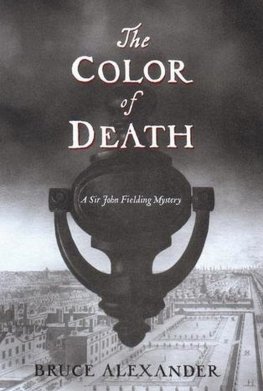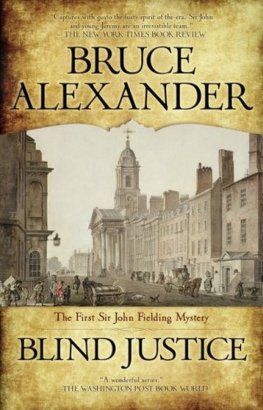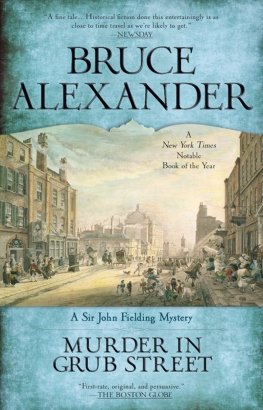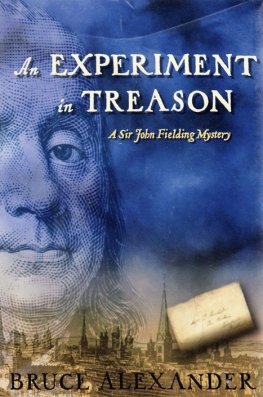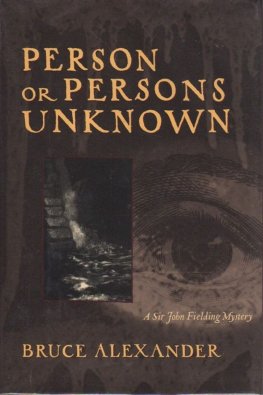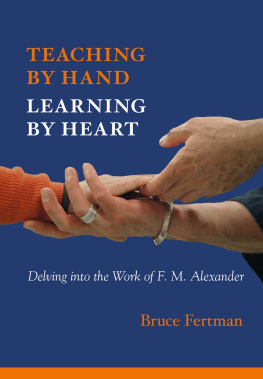Bruce Alexander - Death of a Colonial
Here you can read online Bruce Alexander - Death of a Colonial full text of the book (entire story) in english for free. Download pdf and epub, get meaning, cover and reviews about this ebook. year: 1999, publisher: Putnam Adult, genre: Detective and thriller. Description of the work, (preface) as well as reviews are available. Best literature library LitArk.com created for fans of good reading and offers a wide selection of genres:
Romance novel
Science fiction
Adventure
Detective
Science
History
Home and family
Prose
Art
Politics
Computer
Non-fiction
Religion
Business
Children
Humor
Choose a favorite category and find really read worthwhile books. Enjoy immersion in the world of imagination, feel the emotions of the characters or learn something new for yourself, make an fascinating discovery.
- Book:Death of a Colonial
- Author:
- Publisher:Putnam Adult
- Genre:
- Year:1999
- ISBN:9780425177020
- Rating:5 / 5
- Favourites:Add to favourites
- Your mark:
- 100
- 1
- 2
- 3
- 4
- 5
Death of a Colonial: summary, description and annotation
We offer to read an annotation, description, summary or preface (depends on what the author of the book "Death of a Colonial" wrote himself). If you haven't found the necessary information about the book — write in the comments, we will try to find it.
Death of a Colonial — read online for free the complete book (whole text) full work
Below is the text of the book, divided by pages. System saving the place of the last page read, allows you to conveniently read the book "Death of a Colonial" online for free, without having to search again every time where you left off. Put a bookmark, and you can go to the page where you finished reading at any time.
Font size:
Interval:
Bookmark:
Bruce Alexander
Death of a Colonial
ONE
At the age of sixteen, in the year of 1771, I, Jeremy Proctor, could at last say that my education in the law had properly begun. Having read twice through Sir Edward Cokes Instituted of the Law of England and made copious notes, I had been judged by Sir John Fielding to be ready to begin the study and discussion of it with him. This, Sir John confided, was more or less the same process he himself had followed when he had read law with his brother, Henry. He was of the opinion that what it lacked in formality, it more than made up for in providing the scholar with a proper grasp of the principles of law. It is essential, said he to me on more than one occasion, that in learning to be a lawyer you must first learn to think like a lawyer.
Nor was Sir John my only teacher at the time of which I write (now some twenty-five years past). In an even more informal way I learned something, as well, from young Mr. Archibald Talley. He, though two years my senior, was only a bit further on in his reading of the law, and so we were no doubt well matched in the discussions which took place between us nearly every week. It was commonest for us to share a pew at Old Bailey and then adjourn to a coffee house nearby that we might examine together the trial or trials we had that day witnessed. In this way, each learned from the other, though what we learned was as often false as true usually the product of mere speculation. Of course Sir John knew of these visits to the law courts and of their aftermath spent in discussion, and in general he approved of them. He thought it well that I should have a companion in study, though from time to time as we studied Coke, he would chide some of my more bizarre interpretations, saying, Is that your idea, or something suggested to you by your young colleague? Invariably this was said with a chuckle, so that I could take no offense at it. (Indeed I could take no offense at anything said to me by Sir John.)
It was inevitable that the two should meet if only, for no other reason, because young Mr. Talley had asked so often that they might. He admitted that his eagerness stemmed from a chance remark made by his uncle, Judge Benjamin Talley, to the effect that he thought Sir John the most skilled interrogator of any member of the London bar.
The nephew, Archibald, had then told me that he had asked his uncle why, if this were so, Sir John was but a magistrate.
His uncle had replied to that, Because, you see, he has offended too many of the rich and powerful. Then did he add, shaking a finger at Archibald: And let that be a lesson to you, young sir!
But having knocked so often, Archibald Talley at last had the door opened to him. I first sought Sir Johns permission to bring my fellow scholar to a session at Number 4 Bow Street. Then, having secured it, I invited young Talley round a week later. Together we sat through an early afternoon of pickpocketing, public drunkenness, and putative breach of contract. Thus it was, one might say, a typical sort of day in the magistrate s court of Sir John Fielding.
Young Talley was visibly unimpressed: he yawned; he dozed; he came fully awake only when Mr. Marsden, the clerk, called before Sir John one Nancy Hawken, who was charged with prostitution and who pled not guilty. And though it was she who stood accused, it was her accuser, a Mr. Pyle, who was made to answer most of the magistrate s questions. It became evident through Sir Johns questioning that the situation between the two was this: Pyle had been her client or had, in any case, accepted Mistress Hawkens invitation to her room in Bedford Street with the intention of committing what he called the act of prostitution. His contention was that because she had accepted his money it was but three shillings she was a prostitute. Her contention was that even though she had first taken his money as any sane woman would do nothing more had taken place, due to the fact as he was incapable, owing to his drunken state, Sir John. Therefore, said she, no act of prostitution had taken place. If that were the case, declared Mr. Pyle to the magistrate, then she should pay him back his three shillings. Not so, said she. A customer pays for my time and my consent, and he got both.
There was a loud roar of laughter at that from the crowd that filled the little courtroom. Young Mr. Talley joined in with all the rest. I, having mastered my natural tendency to guffaw with the crowd, waited as, predictably, Sir John beat hard upon the table at which he sat and demanded order from those present.
And so, said the magistrate when all was quiet again, it was when you refused to return Mr. Pyle s three shillings that he accused you of prostitution?
Thats as it seemed to me, Sir John.
Then let me ask you, Mr. Pyle, would you have run forth and fetched a constable if you had been given back the amount you had freely given Mistress Hawken?
That aint the point, declared the accuser. What she done was against the law, and Im for the law, I am.
Admirable, said the magistrate, and let me assure you, sir, I, too, am for the law. Yet it seems to me that the validity of your accusation turns upon the definition of what you call the act of prostitution. According to you, it took place when she accepted your three shillings. According to her, it would have taken place only if some manner of sexual congress had taken place between you. Since, according to her, it did not, she maintains that she owes you nothing, since you were given ample opportunity to do what you had paid for. And so, Mr. Pyle, I am inclined to find in her favor. Mistress Hawkens understanding of what constitutes prostitution is much closer to what is generally accepted. And so your accusation is denied by me. Further, the three shillings in question are hers to keep.
At that, Mr. Pyle set to grumbling loudly, complaining at the unfairness of the decision until the magistrate silenced him with a single stroke of his gavel. Then did Sir John call out to the accused: Mistress Hawken!
I am here, sir.
And a good thing, too, said he, since I have not yet dismissed you. I wish to congratulate you on your defense. I must remind you, however, that as Mr. Pyle has said, prostitution is against the law. You are perhaps luckier than you know that in this instance you did naught that confirmed you as engaging in prostitution but by your own admission you would have done if circumstances had been otherwise. In short, Mistress Hawken, if you come before me again, you may not be so fortunate. My advice to you is to find some other line of work for yourself.
She stood silent before him until, sure at last that he had finished, she raised her voice timidly in response. Ill certainly give that some thought, sir, said she to him.
See that you do. You are now dismissed. And you, Mr. Pyle, if you are still about, you, too, may go.
Then, assured by Mr. Marsden that they had completed their work for the day, Sir John ended the session with another loud clap of his gavel. He rose quickly from his seat, and in a trice, he had disappeared through the door behind him which led indirectly to his chambers.
Would you now like to meet him? I asked young Mr. Talley beside me.
Oh, indeed I would, said he. But then, as we moved against the crowd toward the door, he made a rather curious comment: Had it not been for that last case he tried, said Talley, I should probably have begged off the introduction. To tell the truth, I was quite bored by all those that preceded it. And, I must say, I was a bit disappointed in your man, Sir John. All I could do to keep awake, I fear.
Id suspected as much, of course, for Id seen him yawn and doze. But to speak of his disappointment in Sir John? Even if he had indeed experienced such, it was hardly the sort of thing one would discuss, was it? I thought, said I in a manner rather cool, that you had been quite eager to meet him.
Font size:
Interval:
Bookmark:
Similar books «Death of a Colonial»
Look at similar books to Death of a Colonial. We have selected literature similar in name and meaning in the hope of providing readers with more options to find new, interesting, not yet read works.
Discussion, reviews of the book Death of a Colonial and just readers' own opinions. Leave your comments, write what you think about the work, its meaning or the main characters. Specify what exactly you liked and what you didn't like, and why you think so.


